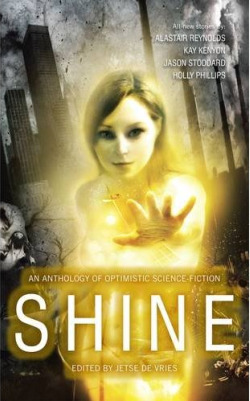From the press release:
Orbit (US) has offered to publish digital editions of all original short fiction written by its authors. The digital editions will be distributed widely through major retail channels, for reading on a variety of devices. Authors will be paid a royalty for each story sold, rather than the flat fee more common in the short story market.
Tim Holman, Orbit VP & Publisher, said: “We know that writing short fiction is important for many of our authors. By offering to publish their short fiction – and to publish it quickly – we will be providing a new way for them to connect with readers. The initial response from our authors has been great, and we are looking forward to launching the first stories later this year.”
Maja Thomas, SVP Hachette Digital, said: “Publishing timely and well-priced short fiction has long been one of HBG’s goals. The digital reading revolution and the proliferation of new devices and mobile platforms now make this possible.”
Interesting. Here’s Nick Mamatas’ initial assessment:
Why, you ask? My theory:
To train the audience to associate digital purchasing with publisher rather than author or the (online) bookstore, thus allowing HBG to more easily sell ebooks direct to the consumer without having to cut in Amazon, Apple, etc. (This can also lead to cheaper ebooks, once one can keep much of what otherwise would be the discount to the trade.) That part of the idea isn’t even a bad one.
And Charlie Stross’ response to such:
If approached, I shall politely tell them what I get paid for my short fiction sales elsewhere, and offer them the opportunity to compete.
[…]
Orbit is part of Hachette. Hachette’s current policy — dictated from a boardroom high in the stratosphere and divorced from earthly considerations — is that DRM on ebooks is mandatory. This won’t be waived for these stories without a major internal argument; so I’m assuming it’s business as usual for now.
Royalties on ebooks are around 20%; viewing this as a new sales channel, they might go higher (25-30%).
Pricing on short story ebooks … they’d look like complete tools if they priced short stories at the same level as novels, so I’m betting on a price point in the range $1-5, probably $2.50-5 (the $1-2 price spread would be better for sales but is difficult, because the cost of processing the credit card/paypal transactions puts a floor of around $0.5 under each sale).
Asking $5.00 for a 12,000 word novelette with DRM on top is not going to boost sales relative to, say, $8 for a 120,000 word novel, also with DRM. So I expect sales to be no better than their current ebook sales, which is to say, dismal. Let’s be optimistic and say they can shift a thousand copies of each story — 1000 sales via Kindle is enough to put you in the monthly Top Ten Bestsellers on that platform. That’s revenue of $5000 for a story, of which somewhere in the range $1000-1500 goes to the author. More realistically they’re going to sell 100-250 copies, meaning the author might get $100-250, eventually, after a couple of royalty periods (6-12 months). Compared to the $600 they’d get from Asimov’s SF, for example — with their rights back after 12 months.
For a tenth of the words that go into a novel that would earn them $10,000.
Does Not Compute, does it?
[…]
If they want to make it work they will have to start paying the authors an advance against future earnings, or run it like tor.com (at a stonking loss for the first couple of years as they build their audience).
That last bit is quite telling, really. I used to hear a timespan of five years bandied around as the duration a print mag needed to survive before it would start making a profit; it’ll be interesting to see how Tor.com makes out over the next few years. But then they were lucky to have had that initial investment behind ’em… I could do amazing thigs with Futurismic if someone would just lend me ten grand… 🙂
It’s also nice to see a major genre publisher realising that not only is there a market for short fiction, but that their writers want to produce it. Common sense would dictate that the lesser-known writers will see the most advantage in pumping out the short stuff, which should maintain the idea that short stories are the genre’s proving grounds.
What do you reckon – can Orbit make digital short fiction work on the royalties model at a price point that keeps both writers and readers happy?
 Shine: An Anthology of Optimistic Science-Fiction by Jetse de Vries (ed.)
Shine: An Anthology of Optimistic Science-Fiction by Jetse de Vries (ed.)